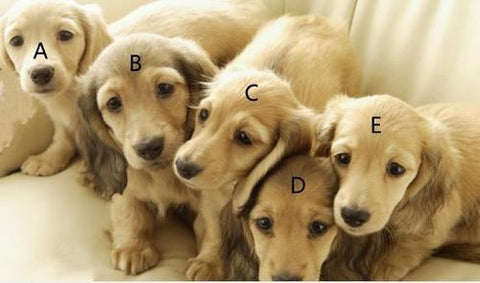
The Psychology of Dogs
Dogs are the most emotional of domesticated animals. When perceiving environmental objects, they often exhibit complex mental processes such as curiosity, investigation, analysis and understanding. In the midst of the constant changes of daily life, dogs often exhibit different personalities and dispositions, and sometimes mood changes, such as anger, sorrow, joy, and the three other common psychological activities of dogs are attachment, nostalgia, curiosity, possession, jealousy, revenge, fear, loneliness, and lying.

1.Attachment and nostalgia
In ordinary life, dogs are attached and fond of their masters, and are always intimate when they meet them. Dogs have more affection for their masters than other dogs. It is this attachment mentality that is the psychological basis for a dog's loyalty to its owner.
When a person or animal leaves its original place of life and moves into a strange environment, there will always be memories of the past, thoughts of friends and relatives, a psychological state of nostalgia for the homeland that psychologists call nostalgic attachment or return psychology. Dogs share this psychology, and the desire to return is more intense than in humans, manifesting itself as a strong ability to return home, as well as a manifestation of dog attachment nostalgia.
2. Possession and curiosity
Dogs have a strong desire for possession, and one of its manifestations is territorial behavior. For this purpose, domestic dogs are capable of guarding their homes, patrolling their territories, hiding food, and protecting their owners and their possessions. Often toys, bones, sticks and twigs are brought into the territory to chew or play with.
Besides, dogs are curious. Driven by curiosity, dogs use their keen senses of smell, hearing, sight and touch to understand the world and gain life experiences. Intense curiosity helps dogs grow intellectually and provides training for later capacity growth and better service to humans.
3. the psychology of revenge
Revenge psychology refers to the idea that a dog that has inflicted trauma or pain on an object can memorize it firmly and wait for an opportunity to retaliate. This memory is often a combination of olfactory, visual, and auditory imprints, and when circumstances are favorable, revenge is exercised. Some fierce Caucasian dogs, for example, often treat their vets as if they are on a revenge list, waiting to get their revenge. To deal with this mindset, a trainer can be used as an enemy or as a target for revenge to improve training effectiveness. Therefore, the owner should not handle the dog roughly, to guard against the dog's revenge and to avoid accidents.
4. Jealousy and competition for attention
Dogs are obedient and loyal to their owners, and love to be loved at all times. When the master suddenly changes the hierarchy or has another pet, the dog will often become jealous of the pet and even fight over it, which indicates a cold master, sulking or attacking the pet.
At the same time, dogs also have the psychology of competing for honors and prizes, which is about getting rewards and love. This competition for love is a psychological activity that develops after domestic. When training dogs, rewards are often used as the primary means of training. They always give a reward in the form of a command or food when the dog completes a specified action behavior. This form of training reinforces the dog's credit-taking psychology.
5. Fear
Psychologists and behaviorists have found that dogs are highly sensitive to environmental stimuli, such as sound, light, fire and death, and are prone to panic attacks. Dogs can tell not only the intensity of a sound, but also its maturity, and are fearful of sudden loud noises.. Untrained dogs, in particular, have a distinct fear of thunder and fireworks. The rumble of airplanes, gunfire, explosions, and other similar sounds are objects of fear for dogs, and they must be trained to overcome and adapt to sound stimuli. Dogs also have a natural fear of strong light, lightning, and fire, which is an instinctive warning of natural phenomena that often cause physiological stress, such as tachycardia, anorexia, etc., and should be avoided during breeding. Dogs can sniff out fear signals from other animals. Dogs release a chemical called pheromones in fear to warn others that "danger is present." For this reason, even dogs that have never been harmed in a veterinary hospital are afraid to enter.

![[TrainerPro] Dog Training Collar with Remote for 2 Dogs](http://www.funnipets.com/cdn/shop/products/page-8_8ae9e4fa-7fb3-4f08-8af8-0c0214684d22_{width}x.jpg?v=1642751785)
![[FunTrainer] Shock Collar for Dogs with Remote up to 875 yards](http://www.funnipets.com/cdn/shop/products/page-4_{width}x.jpg?v=1642751700)
![[FunTrainer] Dog Shock Collar with Remote for 2 Dogs](http://www.funnipets.com/cdn/shop/products/page-5_1d69dcda-629e-4968-ad58-8258216f09d1_{width}x.jpg?v=1642751657)
![[TrainerPro+] Dog Training Collar with Remote for 2 Dogs](http://www.funnipets.com/cdn/shop/products/page-7_a9f4b191-de9a-4934-b5ee-9a2c595d57f1_{width}x.jpg?v=1642751745)